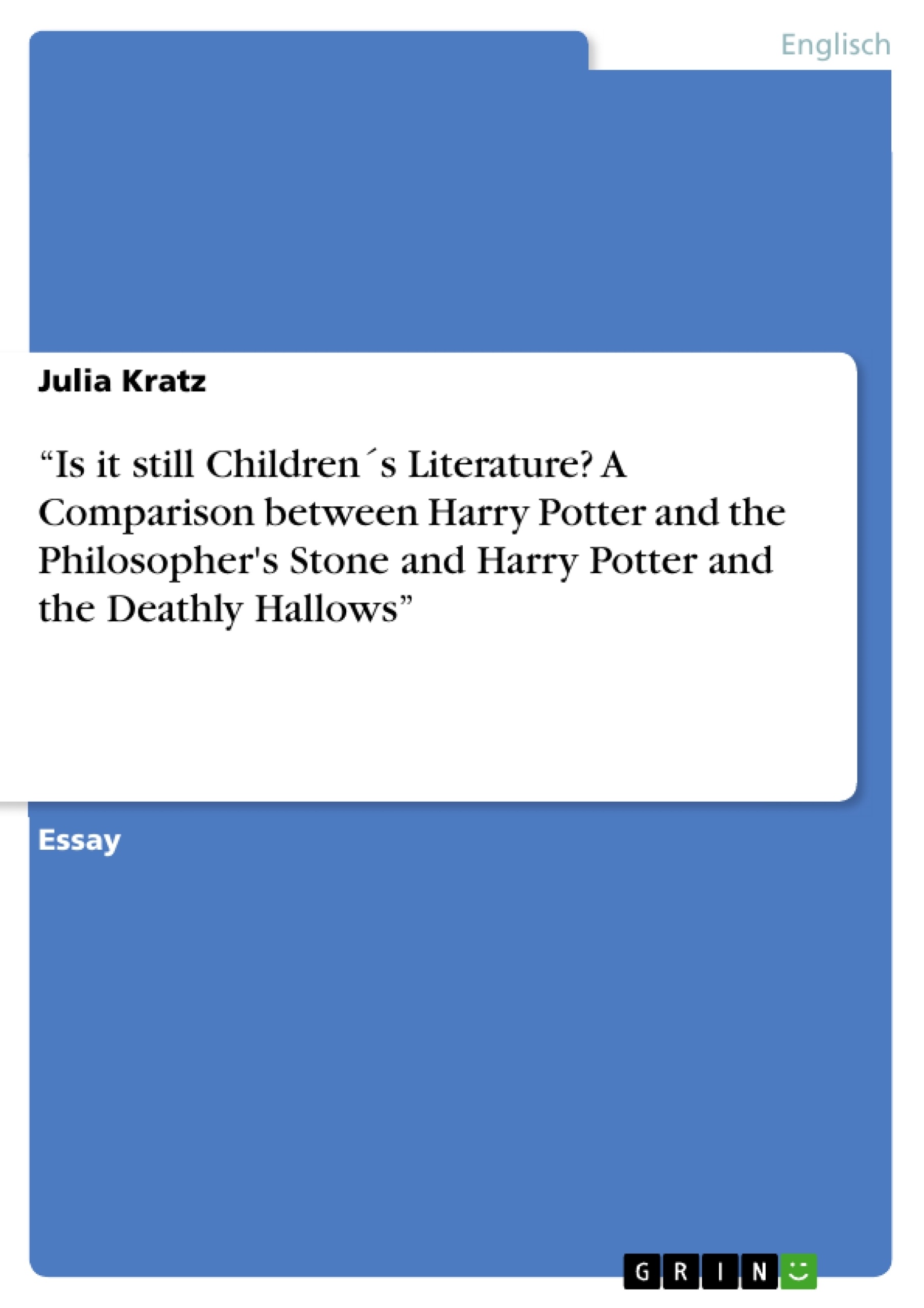J. K. Rowling is one of the most famous authors in modern times. By inventing the character of Harry Potter, she created a completely new fantastic world, full of wizards, magical creatures, and wondrous elements. Alongside the fantastic sorcerer's apprentice saga, Rowling thematises in her seven books how the main character Harry Potter grows up from a childlike hero to a young adult. Moreover, Harry Potter experiences the essential levels of adolescence, thus uncertainty, disorientation, first love, and the creation of a balance between his duties and challenges of life.
Inhaltsverzeichnis
- Einleitung
- Harry Potter und der Stein der Weisen als Kinderbuch
- Childhood
- Pastoral Idyll
- Action
- Harry Potter und die Heiligtümer des Todes als Kinderbuch
- Childhood
- Pastoral Idyll
- Action
- Fazit
- Literaturverzeichnis
Zielsetzung und Themenschwerpunkte
Die vorliegende Arbeit analysiert die Harry Potter-Reihe von J.K. Rowling, indem sie die beiden Romane "Harry Potter und der Stein der Weisen" und "Harry Potter und die Heiligtümer des Todes" hinsichtlich ihrer Eignung als Kinderliteratur vergleicht. Die Arbeit untersucht, ob die beiden Romane die typischen Merkmale der Kinderliteratur erfüllen, insbesondere in Bezug auf die Darstellung von Kindheit, Pastoralidylle und Action.
- Darstellung von Kindheit in der Harry Potter-Reihe
- Pastoralidylle als Merkmal der Kinderliteratur
- Action als zentrales Element der Kinderliteratur
- Entwicklung der Charaktere und Themen im Laufe der Reihe
- Veränderung der literarischen Elemente in den späteren Bänden
Zusammenfassung der Kapitel
Das erste Kapitel analysiert "Harry Potter und der Stein der Weisen" anhand der Merkmale der Kinderliteratur. Es wird gezeigt, dass der Roman die typischen Elemente von Kindheit, Pastoralidylle und Action aufweist. Das zweite Kapitel untersucht "Harry Potter und die Heiligtümer des Todes" im Hinblick auf die Merkmale der Kinderliteratur. Es wird argumentiert, dass der Roman aufgrund der komplexen Themen, der düsteren Atmosphäre und der zunehmenden Reife der Charaktere nicht mehr als Kinderbuch betrachtet werden kann.
Schlüsselwörter
Die Schlüsselwörter und Schwerpunktthemen des Textes umfassen Kinderliteratur, Harry Potter, J.K. Rowling, Stein der Weisen, Heiligtümer des Todes, Childhood, Pastoral Idyll, Action, Entwicklung der Charaktere, düstere Atmosphäre, Reife der Charaktere.
Häufig gestellte Fragen
Gilt die Harry Potter-Reihe noch als Kinderliteratur?
Die Arbeit vergleicht den ersten und den siebten Band und kommt zu dem Schluss, dass sich die Reihe von einem klassischen Kinderbuch zu einem Werk für junge Erwachsene entwickelt.
Wie verändert sich die Darstellung der Kindheit in den Büchern?
Während Harry im ersten Band als kindlicher Held agiert, thematisieren die späteren Bände komplexe Probleme der Adoleszenz wie Orientierungslosigkeit, erste Liebe und die Last der Verantwortung.
Was versteht man unter „Pastoralidylle“ bei Harry Potter?
Dies bezieht sich auf die heile, oft märchenhafte Welt des ersten Bandes, die im krassen Gegensatz zur düsteren Atmosphäre und den existentiellen Bedrohungen im letzten Band steht.
Warum ist der siebte Band kaum noch für Kinder geeignet?
Aufgrund der hohen Gewaltbereitschaft, der düsteren Themen und der komplexen moralischen Dilemmata überschreitet „Die Heiligtümer des Todes“ die typischen Grenzen der Kinderliteratur.
Welche Rolle spielt die Action in der Reihe?
Action ist ein zentrales Element, das sich von spielerischen Abenteuern im ersten Teil zu lebensgefährlichen Schlachten und strategischen Kämpfen im Finale entwickelt.
- Quote paper
- Julia Kratz (Author), 2014, “Is it still Children´s Literature? A Comparison between Harry Potter and the Philosopher's Stone and Harry Potter and the Deathly Hallows”, Munich, GRIN Verlag, https://www.grin.com/document/283286



